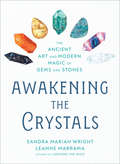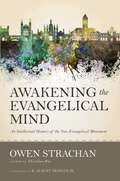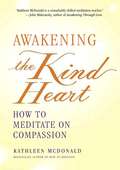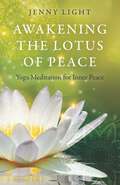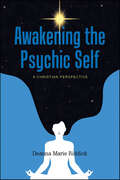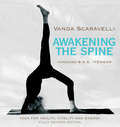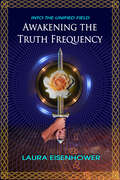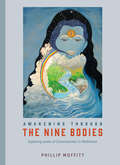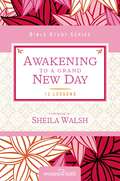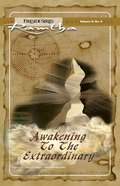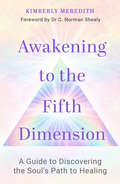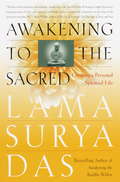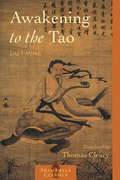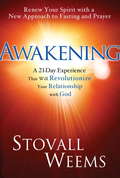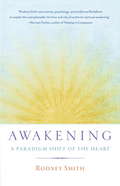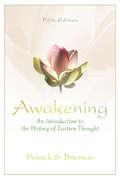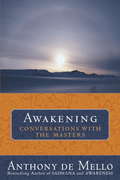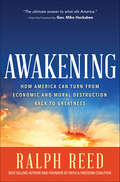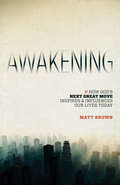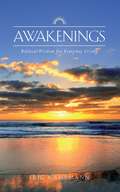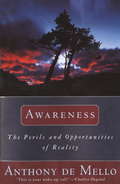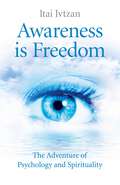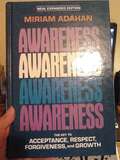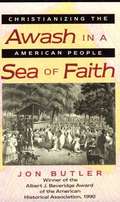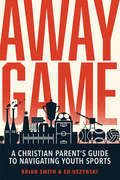- Table View
- List View
Awakening the Crystals: The Ancient Art and Modern Magic of Gems and Stones
by Sandra Mariah Wright Leanne MarramaA gorgeously illustrated guide to stimulating creativity, inviting in love, achieving your goals, and improving your life with crystals.Whether you would like to take back control in an uncertain world, encourage harmony in the home, or invite in prosperity, Awakening the Crystals will help transform your life. Learn how to: • choose stones for protection at home and on the road • calm your nerves and boost your energy • foster positive interactions with family • attract love and enhance intimacy • achieve health goals • welcome good luck, growth, and success • meditate and manifest results with the assistance of crystals Whether it&’s rose quartz for love or a tiger&’s eye for protection, Salem-based intuitives Sandra Wright and Leanne Marrama show you how to put the power of these simple, ancient tools to work in your daily life, to improve your relationships, achieve success, increase health, honor those who have passed, promote self-love and -care, and make magic happen—from the bedroom to the office and everywhere in between. Beautiful watercolor illustrations demonstrate how to choose, connect with, charge, cleanse, and arrange crystals throughout your home to help you live your best life.
Awakening the Evangelical Mind: An Intellectual History of the Neo-Evangelical Movement
by R. Albert Mohler Jr. Owen StrachanThe first major study to draw upon unknown or neglected sources, as well as original interviews with figures like Billy Graham, Awakening the Evangelical Mind uniquely tells the engaging story of how evangelicalism developed as an intellectual movement in the middle of the 20th century. Beginning with the life of Harold Ockenga, Strachan shows how Ockenga brought together a small community of Christian scholars at Harvard University in the 1940s who agitated for a reloaded Christian intellect. With fresh insights based on original letters and correspondence, Strachan highlights key developments in the movement by examining the early years and humble beginnings of such future evangelical luminaries as George Eldon Ladd, Edward John Carnell, John Gerstner, Gleason Archer, Carl Henry, and Kenneth Kantzer.
Awakening the Kind Heart
by Kathleen McdonaldEveryone appreciates kindness. A smile, a few friendly words, a show of concern when we're troubled or feeling unwell, an offer of help - gestures of kindness like these brighten our day and ease whatever sadness we may feel in our hearts. Feeling that "someone cares" fulfills a very deep need that we all have. And just as we appreciate other people being kind to us, others appreciate it when we are kind to them. That is why it is important to learn to be kind, because it will help make our relationships and interactions with others more satisfying and less problematic. But it's not always easy to be kind. Sometimes our hearts are filled with anger, jealousy, or pride, and being kind is the last thing we feel like doing. Or we get so caught up in our work and responsibilities that we find no time to think of others and their needs, no time to be kind and gentle. However, these problems can be remedied. The Buddhist tradition offers a wealth of methods that can be used to overcome whatever prevents us from being kind and gentle. Some of these methods are explored and explained in this book - in a way that will allow you to practice them in your daily life. Awakening the Kind Heart offers powerful and inviting meditation techniques to activate the heart of kindness within us all - a modern and motivating interpretation of traditional and powerful practices.
Awakening the Lotus of Peace: Yoga Meditation for Inner Peace
by Jenny LightAwakening the Lotus of Peace is a yoga book of how to go deeper in meditation to reach the highest goal of Samadhi and find lasting peace. This a detailed book of exercises, pranayamas and meditations by a kundalini-awakened teacher, explaining how to bypass or overcome many of the meditation pitfalls with reference to yoga philosophy, Patanjali and the Bhagavad Gita.
Awakening the Psychic Self: A Christian Perspective
by Deanna Marie RiddickThrough the warm and compelling story of a conflicted Christian hiding psychic skills, learn to awaken your special gifts of the spirit. Many devout Christians conceal their psychic abilities or deny the reality of their gifts, due to the immense sense of fear and condemnation engendered by biblical scripture. Especially for Christians, but applicable to all, this sojourn will teach you how to fully bridge the seeming polarity of Christianity and the psychic realm. Broken into two parts, the first will take you along the path of growing up Christian with an upbringing teaching of sinful and punishable acts relating to the seeking out of mediums, psychics, and fortune tellers. The second part is chock-full of practical exercises, meditations, and techniques to develop your psychic abilities and connect to Christian religious aspects in a way that is comfortable.
Awakening the Spine
by Vanda ScaravelliA revolutionary new method of yoga for overall fitness that teaches "if it hurts, it's wrong'"--from a vibrant 83-year-old master.
Awakening the Truth Frequency (Into the Unified Field)
by Laura EisenhowerLaura Eisenhower is a master astrologer and the great granddaughter to five-star general and 34th president Dwight D. Eisenhower. As a child, she intimately sensed the resistant forces working around her and embarked on her own journey into the underworld, only to discover her own truth frequency and overcome the many challenges in life by the remembrance of the divine feminine energies in union with the masculine, which is encoded in our DNA. Her experience has included extreme wilderness training and an attempted recruitment into living off-planet on Mars as part of the secret space program, which revealed to her many things. She declined, to stay true to her purpose here on Earth. She is quite informed of our galactic history, the different timelines of humanity, and the window period in which we are ascending in the Great Awakening.
Awakening through the Nine Bodies: Explorations in Consciousness for Mindfulness Meditation and Yoga Practitioners
by Phillip MoffittBased on meditation practices Phillip Moffitt learned twenty years ago from Himalayan yoga master Sri Swami Balyogi Premvarni, this beautifully illustrated book is a guide to exploring the nature of mind and gaining a better understanding of experiences that arise during meditation. The Nine Bodies teachings map out a journey that starts with consciousness that arises in the physical body and is directly observable, and then travels through ever more subtle levels of consciousness to that which is not manifest and is only potential, and therefore has to be inferred. The book includes a series of mysterious illustrations that Balyogi created during his time of intense Samadhi explorations. Each illustration is a rich composition of symbols that express aspects of inner experiences that are almost impossible to express with language.Moffitt makes these teachings available for meditation students from all spiritual traditions to use as gateways for exploring the nature of mind and as additional means for tracking and classifying meditative experiences. Students of yoga will also find value in the teachings of the Nine Bodies as they provide a means for contextualizing and connecting with yogic teachings on chakras, koshas, gunas, and the Three Bodies.
Awakening to a Grand New Day (Women of Faith Study Guide Series)
by Sheila Walsh Margaret Feinberg Women Of FaithWe expect so much of ourselves. We want to be the best daughters, moms, and friends that we can be. We try to act in ways that are pleasing to God and set standards that are hard to maintain. All too often we fail in our efforts—and end up feeling disappointed, discouraged, and convinced things will never change. In this study, readers will discover that this isn’t God’s plan for our lives. No matter what mistakes, errors, or blunders we have committed in the past, He will redeem us and set us on a new path! The best part is that we don’t have to wait to awaken to this grand new day. As we connect with God, He will reveal His plans for us today!
Awakening to the Extraordinary (Fireside (New Leaf/JZK))
by Ramtha&“When is living the same boring existence enough? When will you wake up and create a new dream and indeed a new paradigm? In my lifetime I would term those adventures. When you wake up and decide you wish to have an adventure, the ways and means to that adventure simply fall into place because you want it and you are ready for it. It is quite amazing. This is a divine quality and is not coincidence. Consciousness and energy creates the nature of reality, and whatsoever you think becomes your life. It is what gives you that essence of divinity.&” - Ramtha
Awakening to the Fifth Dimension: A Guide to Discovering the Soul’s Path to Healing
by Kimberley MeredithIf you're suffering from chronic illness and persistent symptoms, this book holds a revolutionary solution. Prepare to discover a new dimension of healing.Perhaps you're struggling with a seemingly incurable illness. Or maybe a loved one is showing prolonged symptoms. Whatever your situation, Kimberly Meredith is here to show you a way out of the suffering.Awakening to the Fifth Dimension means tapping into your full potential. It means entering a higher state of consciousness and opening up to unconditional love, forgiveness and acceptance. Full of practical methods, nutrition, case studies and testimonials, Awakening to the Fifth Dimension will empower you to confront your own health struggles and find true, lasting healing. You'll discover:· methods to alleviate mental, emotional and physical ailments· spiritual practices that will lift you into the realm of the Fifth Dimension· stories, exercises, prayers, affirmations, and other information to elevate your mind, body and soul.· a chapter on nutrition, supplements and recipes to support your healing· ways to enter a higher state, including crystals and meditationThis book will open a portal into the Fifth Dimension way of thinking and living. Find happiness and freedom with Kimberly's gentle wisdom and guidance.
Awakening to the Sacred
by Lama Surya Das'If you have picked up this book, then in all probability you are a seeker. 477 Seekers are ubiquitous: They can be found in every nation; they can be part of any religious group or denomination. The search for truth and love-- something beyond and bigger than ourselves-- is the common element.' Lama Surya Das In AWAKENING TO THE SACRED Lama Surya Das addresses one of the greatest challenges that spiritual seekers face today-- how to create a daily spiritual life from scratch and thereby find ways to integrate spiritual values and practices into whatever we do. In this continuation of the teachings that began in his critically acclaimed AWAKENING THE BUDDHA WITHIN (Bantam), Lama Surya Das shows readers how to creat a personalised, day-to-day spiritual practice based on the rituals and spiritual philosophies of a variety of religious traditions. The thoughtful and inspiring essays in this sourcebook explore meditation, chanting, yoga, prayers, affirmations and breathing exercises as simple ways to connect with the sacred in everyday life. Lama Surya Das is the most highly trained American lama in the Tibetan tradition, and has spent close to twenty-five years in Tibetan monasteries around Asia. He is a leading spokesperson for Western Buddhism and regularly organises Buddhist teachers' conferences with the Dalai Lama, lectures at a range of US institutions, and conducts retreats and workships in ten different countries each year. In 1991 he founded the Dzogchen Foundation in Massachusetts and New York.
Awakening to the Tao
by Thomas Cleary Lui I-MingThe Tao is the ancient Chinese "Way" that has inspired numerous books, from The Tao of Physics to The Tao of Sex . This book might be called "The Tao of Tao." In 142 brief meditative essays, the author uses simple language and natural imagery to express the essence of the wisdom that holds the key to success in every human endeavor. Liu I-ming (b. 1737) was a Taoist adept and a scholar of Buddhism and Confucianism. He is the author of commentaries on several Taoist classics that have been published in English, including The Taoist I Ching , also translated by Thomas Cleary.
Awakening: A New Approach to Faith, Fasting, and Spiritual Freedom
by Stovall WeemsStop hitting the spiritual snooze button.Would you describe your walk with God as fresh and exciting? Would you describe your spiritual life as vibrant and passionate? If not, would you like these attributes to be the norm in your everyday relationship with God? Are you ready to experience an awakening? Awakening helps you stir up your slumbering soul. You&’ll discover how to break out of your season of dryness or get off to a great start either in the New Year or the next season in life. Take your faith-walk from a &“going through the motions&” or &“have to&” mindset to the stimulating, fresh &“want to&” experience of enjoying God&’s presence—24/7. Weems encourages you to surrender fully, to discover the right kind of fuel for the journey, and to learn a new way to pray and fast. This lifestyle is not based on rules or religion, but on a deep, satisfying, motivating relationship with God. Included in Awakening is a 21-Day Plan that will guide you through the principles that ensure a lasting, fresh relationship with God—even in a world where everything quickly becomes stale. &“It&’s time to wake up and put an end to spiritual sluggishness! I promise this year will be the best of your life if it is your best year spiritually.&” – Stovall Weems
Awakening: A Paradigm Shift of the Heart
by Rodney SmithWhat is enlightenment? Rodney Smith's answer to that elusive question offers an explanation not only of the radical shift in perception that the word enlightenment connotes, but of the entire topography of the journey from beginning to end, of the multiple ways we undermine the very growth we seek, and of the awakened life that ultimately arises out of the new consciousness.
Awakening: An Introduction to the History of Eastern Thought
by Patrick S. BresnanAwakening: An Introduction to the History of Eastern Thought engages students with anecdotes, primary and secondary sources, an accessible writing style, and a clear historical approach. The text focuses on India, China, and Japan, while showing the relationships that exist between Eastern and Western traditions. Patrick Bresnan consistently links the past to the present, so students may see that Eastern traditions, however ancient their origins, are living traditions and relevant to modern times.
Awakening: Conversations with the Master
by Anthony De MelloThese daily meditations by Anthony de Mello focus on The Master--not one single person, but a Hindu guru, a Zen roshi, a Taoist sage, a Jewish rabbi, a Christian monk. He is Lao Tzu and Socrates, Buddha and Jesus, Zarathrustra and Muhammad.
Awakening: How America Can Turn from Moral and Economic Destruction Back to Greatness
by Ralph ReedRalph Reed is a perennial commentator on CNN, NBC, CBS, and Fox News, who has a support database of 18 million voters. He has advised presidential candidates for the last six election cycles. Highly respected by conservatives and liberals alike, Reed outlines why and how our country will awaken from its current destructive path and return to a new age of blessing.
Awakening: How God's Great Move Inspires & Influences Our Lives Today
by Matt BrownWe keep hearing about weakening faith in our country, but God is alive and well in America. He is working right here and now in people of faith. This book will awaken your heart and soul to his presence and to the power of Christianity today, which will in turn ignite your faith and change your world.Christians in America are inundated with negative stories and statistics about the decline of the faith. Awakening is a very encouraging counter balance of astounding stories of God at work all around the world, and it will inspire you to take part.Brown shares a collection of stories from his own experience that will deeply move and inspire Christians burdened over the state of our nation. He shares detailed descriptions of movements of faith reaching countless numbers of people for Christ--movements of deeply grounded faith in America led by the next generation.This is a book that at every turn awakens believers to God's amazing work, and how they can be inspired to see the touch of God in their own community and church.
Awakenings: Biblical Wisdom for Everyday Living
by Eric KampmannThis small book of biblical reading and short commentary is designed as an easy-to-use companion to the Bible, and to the daily Awakenings podcasts with Chuck Davis and EricKampmann. Both the book and the podcasts are formatted to help inspire a brief daily conversation built around passages from the Bible, focusing on how the biblical and the everyday intersect in sometimes unexpected ways. The so what and now what help bring the Bible to life in a tangible way. Since self-publishing Tree of Life in 2003, Eric Kampmann has been on a mission to help others enjoy the power, wisdom, and beauty of the entire Bible. Coupled with the daily podcast with Pastor Chuck Davis, Awakenings is an excellent introduction to appreciating the Bible every day.
Awareness
by Anthony De MelloUsing humor, compassion, and insight, the beloved and best-selling Anthony de Mello teaches us to welcome the challenge of knowing ourselves and living the "aware" life.From the Trade Paperback edition.
Awareness Is Freedom: The Adventure of Psychology and Spirituality
by Itai IvtzanAwareness Is Freedom: The Adventure of Psychology and Spirituality proposes a unique combination of spiritual and psychological concepts that together lead to greater self-awareness and wellbeing. It is structured as eight lessons, each focusing on different aspects of psychology and spirituality, to support readers in their personal journey of self-growth. The psychological and spiritual theories described in the book are backed up by scientific findings that enhance the legitimacy and power of its message. The book also includes practical exercises which allow the reader to apply the ideas in an enjoyable way that will lead to self-improvement and greater satisfaction in life.
Awareness: The Key To Acceptance, Respect, Forgiveness, And Growth
by Miriam AdahanAwareness is based on an age-old system of personality analysis known as the Enneagram. It is an astonishingly precise and accurate explanation of nine basic personality types their distinct gifts, temperaments, strengths, and weaknesses. As you read, you will clearly recognize yourself and others. This deeper level of awareness is not only enlightening, but empowering. It enables you to realize your own inner essence and drives, as it provides the understanding you need to relate better in all personal relationships: with spouse, family, friends, business, and work associates. What gives this title an added dimension is its fusion with the divine wisdom and life values of traditional Judaism, so this becomes a true spiritual journey as well. Written in a manner that all readers can easily relate to, Awareness is an illuminating life-transforming tool for personal growth and genuine fulfillment.
Awash in a Sea of Faith: Christianizing the American People (Studies in Cultural History)
by Jon Butler<p>Challenging the formidable tradition that places early New England Puritanism at the center of the American religious experience, Yale historian Jon Butler offers a new interpretation of three hundred years of religious and cultural development. Butler stresses the instability of religion in Europe where state churches battled dissenters, magic, and astonishingly low church participation. He charts the transfer of these difficulties to America, including the failure of Puritan religious models, and describes the surprising advance of religious commitment there between 1700 and 1865. Through the assertion of authority and coercion, a remarkable sacralization of the prerevolutionary countryside, advancing religious pluralism, the folklorization of magic, and an eclectic, syncretistic emphasis on supernatural interventionism, including miracles, America emerged after 1800 as an extraordinary spiritual hothouse that far eclipsed the Puritan achievement--even as secularism triumphed in Europe. <p>Awash in a Sea of Faith ranges from popular piety to magic, from anxious revolutionary war chaplains to the cool rationalism of James Madison, from divining rods and seer stones to Anglican and Unitarian elites, and from Virginia Anglican occultists and Presbyterians raised from the dead to Jonathan Edwards, Joseph Smith, and Abraham Lincoln. Butler deftly comes to terms with conventional themes such as Puritanism, witchcraft, religion and revolution, revivalism, millenarianism, and Mormonism. His elucidation of Christianity's powerful role in shaping slavery and of a subsequent African spiritual "holocaust," with its ironic result in African Christianization, is an especially fresh and incisive account. <p>Awash in a Sea of Faith reveals the proliferation of American religious expression--not its decline--and stresses the creative tensions between pulpit and pew across three hundred years of social maturation. Striking in its breadth and deeply rooted in primary sources, this seminal book recasts the landscape of American religious and cultural history.</p>
Away Game: A Christian Parent's Guide to Navigating Youth Sports
by Brian Smith Ed UszynskiTransform the competitive sports field into a discipleship opportunity as you help your young athlete become not just a better player but a devoted follower of God. If we don&’t own the process of discipling our kids as they play sports, sports culture will do it for us. But as parents, we can get so consumed with our young athletes&’ physical development that we miss the opportunities athletics provide to help them grow spiritually. Away Game challenges us to be more than spectators on the sidelines of our kids&’ spiritual lives. Discover how to: Leverage sports as a platform for instilling biblical values in kids and teens. Keep joy, play, and gratitude at every level of your child&’s athletic experience. Use sports involvement as an opportunity to strengthen your relationship with your child—from car-ride conversations to post-game processing. Spark faith-based discussions about sport-culture challenges such as handling pressure, dealing with failure, and being a next-level teammate. Counter the toxic elements of today&’s youth sports culture by cultivating kingdom virtues like self-control, humility, and peace—in yourself and your kids. Away Game empowers you to embrace the role of spiritual mentor throughout your child&’s athletic journey as you recognize—in the margins of every practice or game—winning opportunities for spiritual growth.
